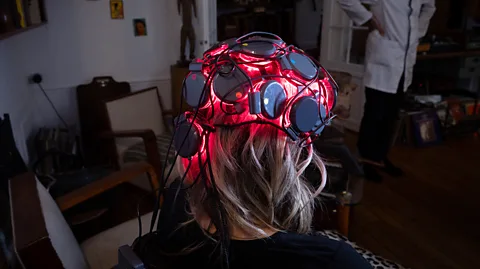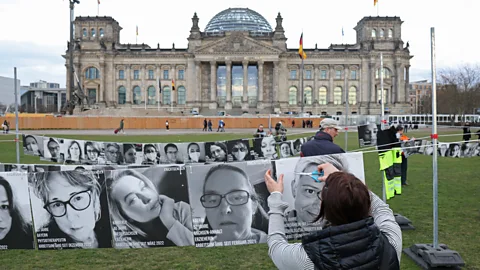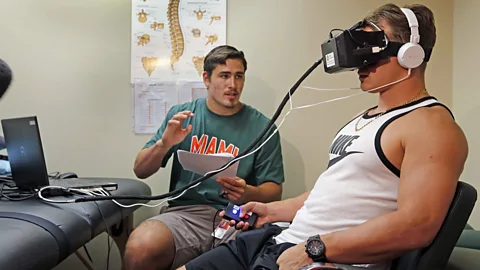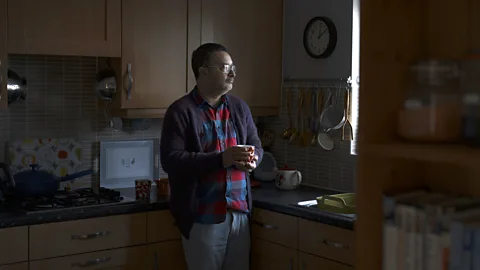How Long Concussion could offer new insights into Long Covid
 Getty Images
Getty ImagesThere are striking parallels between the two syndromes – and scientists hope the link could help to unravel the mysteries of both.
Midway through 2023, the neurologist Ioannis Mavroudis was working his way through the latest backlog of cases when he was struck by a revelation.
As a concussion specialist who had spent many years in his post at Leeds Teaching Hospitals NHS Trust, Mavroudis had found himself dealing with a growing influx of patients with Long Covid – a loose assortment of health problems developed after an infection with Covid-19.
Many of these patients were presenting with a range of neurological symptoms. Mavroudis could not help but notice that their symptom patterns – fatigue, sleep disturbances, light and noise sensitivity, exercise intolerance and problems with memory and concentration – were strikingly similar to those associated with another mysterious long-term condition known as post-concussion syndrome or 'Long Concussion'.
Instead of being triggered by a viral infection, post-concussion syndrome can affect anyone who has suffered some form of a knock to the head, leaving them with symptoms lasting for months or years. The initial impact can range from extremely mild to severe, and it can affect both professional and amateur athletes, military veterans, victims of physical abuse and epileptic patients who have fallen during a seizure.
"I work with athletes, and I’ve seen many professional rugby players with this," says Mavroudis. "Like Long Covid, some end up suffering with it for many years."
Mavroudis believes that post-concussion syndrome is related to the energy demand on the brain’s neurons as a result of the head trauma, something which has been discussed in research papers. “Early in the concussion, the neurons need so much energy, more than the brain can provide, which causes the fatigue, and then they get locked in this vicious cycle,” he says.
Mavroudis was so intrigued by the overlap that he cited it in a scientific review of post-concussion syndrome, published in May 2023. But he wasn't the first to note it. Half a year earlier, a group of concussion experts at the University of Denver, Colorado, had also published their findings on the seemingly unlikely parallels between the two conditions.
 Getty Images
Getty ImagesWhen they applied standard concussion tests to Long Covid patients, the University of Denver researchers noticed the same tell-tale issues. One was problems with eye-tracking movements, as assessed via the King-Devick test, which measures the ability to scan numbers on a card from left to right in a zig-zag fashion under time pressure. The results of balance and spatial reasoning examinations also suggested that the patients had effectively experienced a traumatic injury to the brain.
Intrigued, the group suggested that the same diagnostics used for concussion could provide a much-needed way of assessing progress made by these patients. They argued that technologies stimulating the vestibular system - the sensory network in the brain which co-ordinates the position and movement of our head in space - could be trialled a new treatment approach for Long Covid.
But for Herbert Renz-Polster, a researcher at the University of Heidelberg, who has spent many years trying to understand a parallel disease, Myalgic Encephalomyelitis, also known as Chronic Fatigue Syndrome (ME/CFS), this connection came as no surprise.
Behind the brainstem
While chronic infections are thought to be one of the major instigators of ME/CFS, with up to 75% of patients experiencing an infection-like episode before the onset of their illness, studies have also reported that many patients have hypermobility between the skull and upper spine. This can occur due to ligament weakness or inherited conditions such as Ehlers Danlos syndrome which cause abnormalities in the connective tissues.
"A very significant portion of ME/CFS patients have abnormalities in how the head is supported," says Renz-Polster.
According to Renz-Polster, these cases may provide valuable insights into what happens in post-concussion syndrome. In both incidences, he believes that the problems stem from the brainstem, stalk-like structure connecting the brain and spinal cord, becoming constricted. This can either happen due to the skull being too mobile and falling backwards, or a forceful impact.
"The brainstem coordinates connectivity in the brain," says Renz-Polster. “So, when it gets squished, that leads to a complete disruption of the connectivity and flow of information between the various centres that underlie our brain functions." He explains that this is why ME/CFS patients can have a hard time adapting to any kind of stress, whether psychological, muscular, or cognitive. "Every kind of stress sends them into dysfunction," he says.
In recent years, research has also revealed that the brainstem is particularly vulnerable to various neurotropic viruses, ones capable of accessing the brain. Studies have shown that the ACE2 receptor used by the SARS-CoV-2 virus is relatively abundant in the brainstem compared with other regions, while autopsies have even found the virus' RNA and proteins in this part of the brain. It is also thought to be particularly sensitive to damage from the excessive immune activation which can be triggered by infections.
 Getty Images
Getty ImagesRenz-Polster's theory is two-fold. He believes that an initial trauma - either from a forceful impact or a viral infection – can potentially impair the activity of the brainstem as well as disrupting the fragile membrane separating the brain from the bloodstream. This allows inflammatory molecules to damage the lining of the many small blood vessels which feed the brain, something which has knock-on consequences for mitochondria, the many tiny energy factories which power every cell in the body from neurons to muscle cells.
"Mitochondrial dysfunction is a fact in all of these conditions [Long Concussion, ME/CFS]," he says. "But I don't think this is the primary issue. The mitochondria themselves are just fine, but their supply has been turned off. And this is why Long Covid, ME/CFS, and post-concussion syndrome patients can have these days where they feel fine, and then they crash. It's because the mitochondria are not well supplied," he says.
New treatment paradigms
While these explanations are still only theories, Renz-Polster says that they should be possible to prove using more advanced scanning technologies such as ultrahigh-field MRI. This approach could allow investigators to conduct more detailed examinations of the brainstem of patients, something which has always been difficult to do due to its relatively small size and anatomical complications.
"For a long time, the brainstem was an area that you couldn't study because it’s in a different place every time you breathe," says Renz-Polster. "But you can't just tell the patient not to breathe."
Renz-Polster is particularly intrigued by the potential of psychedelic drugs such as ibogaine, psilocybin and ketamine, which modulate the default mode network, a group of brain regions including the brainstem. Earlier this year, a small study found that the combination of ibogaine and magnesium seemed to improve brain functioning in US military veterans with traumatic brain injury, while there are some anecdotal reports of Long Covid patients experiencing benefit from MDMA and psilocybin therapy.
 Getty Images
Getty Images“Ibogaine and psilocybin work on the default mode network, which is involved in coordinating all brain function,” says Renz-Polster. "I would be very, very supportive of trying these drugs for Long Covid." (However, this should not be attempted without medical supervision and approval - do not try this at home.)
There are also other patterns which have been seen in ME/CFS, Long Covid and patients who have suffered severe concussions due to traumatic brain injury. One is the reactivation of latent viruses which are permanently ingrained in the genome, such as herpes viruses, which can cause cold sores and genital herpes, or varicella zoster virus, which causes chickenpox and shingles. Once they're reawakened, it's thought that they may lead to inflammation.
Renz-Polster suspects that in all three cases, this viral reactivation could contribute to some of the ongoing symptoms like fatigue and brain fog. While there isn’t a definitive strategy for silencing these viruses once awoken, ideas such as administering the BCG vaccine for tuberculosis have previously been explored as a way of stopping the reactivation of various herpes strains, with some success.
With a dearth of effective treatments and millions of people around the world believed to be impacted by these conditions, researchers are hopeful that understanding the crossover between Long Concussion and Long Covid will yield answers which could help all those affected.
"I'm optimistic," says Mavroudis. "I believe that there will be some treatments that might be able to change how the brainstem works in these patients and might be able to help them with the sleeping issues, and with tiredness and fatigue."
--
If you liked this story, sign up for The Essential List newsletter – a handpicked selection of features, videos and can't-miss news, delivered to your inbox twice a week.
